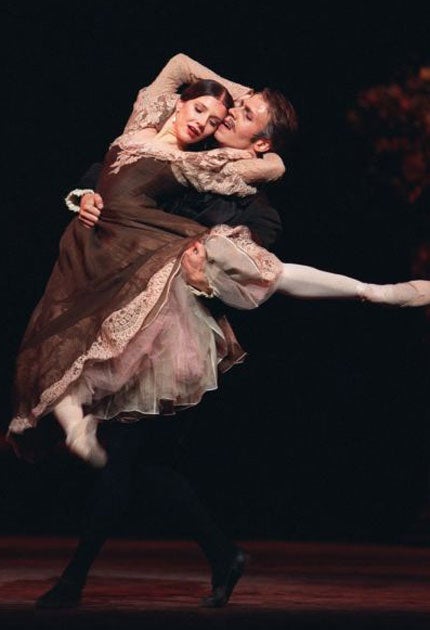Onegin, Royal Opera House, London
Lukewarm love in a cold climate

Your support helps us to tell the story
From reproductive rights to climate change to Big Tech, The Independent is on the ground when the story is developing. Whether it's investigating the financials of Elon Musk's pro-Trump PAC or producing our latest documentary, 'The A Word', which shines a light on the American women fighting for reproductive rights, we know how important it is to parse out the facts from the messaging.
At such a critical moment in US history, we need reporters on the ground. Your donation allows us to keep sending journalists to speak to both sides of the story.
The Independent is trusted by Americans across the entire political spectrum. And unlike many other quality news outlets, we choose not to lock Americans out of our reporting and analysis with paywalls. We believe quality journalism should be available to everyone, paid for by those who can afford it.
Your support makes all the difference.After dancing an impassionedpas de deux with her dream lover, Alina Cojocaru's Tatiana wakes up with a shiver, surprised to find herself out of bed, her dream still clinging to her. It's a lovely performance, part of an evening where small, naturalistic reactions have more impact than the wrestling lifts of John Cranko's choreography.
Onegin makes a slow start to the Royal Ballet's new season. Cranko's stodgily operatic ballet survives because its leads respond boldly to the big dramatic opportunities it offers. Cranko takes his story from Pushkin's poem, via Tchaikovsky's opera. The bookish Tatiana falls for the Byronic, bitter Onegin, and is rejected. Years later, he meets her in St Petersburg, now the wife of an aristocrat. This time, she rejects him.
The ballet focuses on four main characters – Onegin and Tatiana, and Olga and her fiancé, Lensky, who is killed by Onegin in a duel. Around them, the corps de ballet are busy but ill-defined. They're always running on as party guests or country folk, but their dances lack impact. The music – more Tchaikovsky, but not from the opera – is part of the problem. Kurt-Heinz Stolze assembled a patchwork from other Tchaikovsky works, including Francesca da Rimini.
The first act is strangely melancholic, even when Olga and Lensky dance happily together. There's nothing as irresistibly dancey as the opera's big numbers, but Cranko's corps are stuck with filler. The big pas de deux put huge steps to surging music, but without really responding to its shape and pulse.
The second act is the strongest, its party scene allowing more interaction between the characters, which are finely drawn. Olga and Lensky, still happy, bump into an offended older couple. They apologise politely, but get giggly as soon as they turn away. Tatiana and Onegin are pushed into an embarrassed social dance, going sheepishly through the motions while everyone else has a good time.
Elsewhere, Cranko focuses so much on Tatiana that the other characters are short-changed. Why do Olga and Tatiana show up at the duel scene? And why, once Olga's fiancé has been killed, is it all about Tatiana's shocked response to events?
Cojocaru is a believably sensitive Tatiana, naïve enough to see Onegin's distance as romantic. She matures into an elegant married woman, clinging tenderly to her husband or hurling her small, light body into the passionate clinches with Onegin.
Johan Kobborg is an unnerving Onegin, chilly and bitter. His partnering is secure, his turns clean and sharp. Steven McRae is a splendid Lensky, with fluid classical dancing and deft characterisation. He romps cheerfully with Takada's coltish Olga, then turns to searing anger when she flirts with Onegin. His rage before the duel scene makes him all the more vulnerable.
Looking ahead, most of this season's interest comes from casting, rather than repertory. There's a single new work before Christmas, and not much excitement in the choice of revivals. As this Onegin shows, the Royal Ballet has no shortage of strong dancers, from established stars like Cojocaru to rising dancers like Akane Takada, who plays her sister Olga. They need challenges.
In rep to 25 October (020 7304 4000)
Join our commenting forum
Join thought-provoking conversations, follow other Independent readers and see their replies
Comments